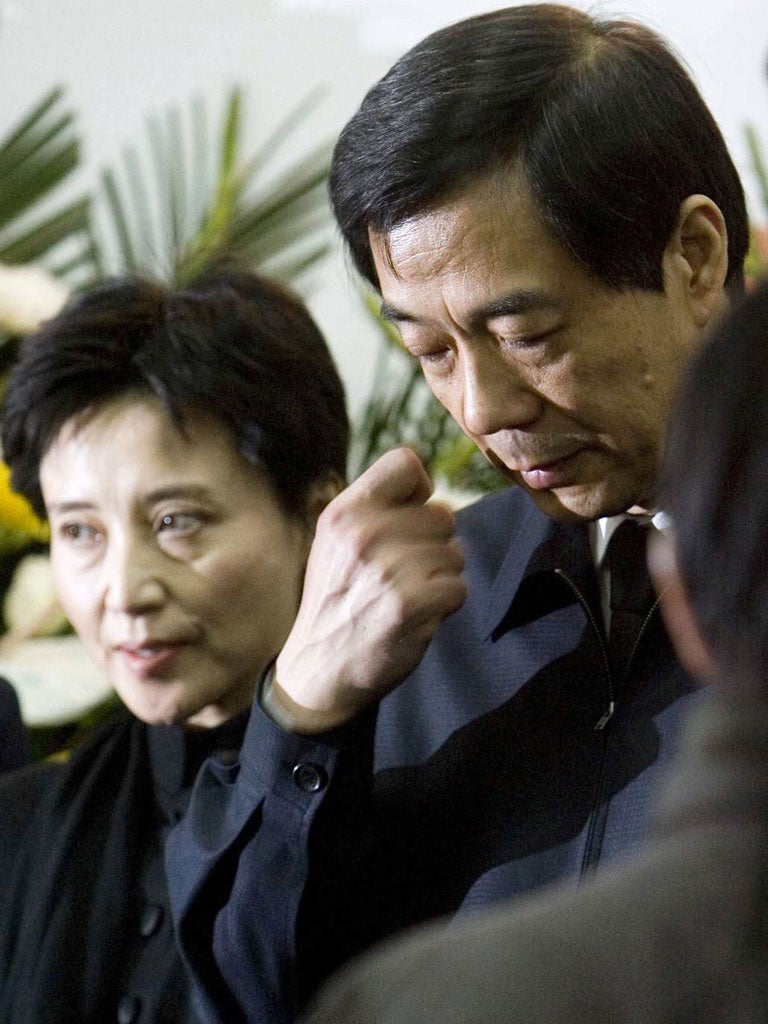China charges Bo Xilai's wife Gu Kailai over UK man's death
Gu Kailai faces trial over death of Neil Heywood in scandal that shook Chinese establishment

Your support helps us to tell the story
From reproductive rights to climate change to Big Tech, The Independent is on the ground when the story is developing. Whether it's investigating the financials of Elon Musk's pro-Trump PAC or producing our latest documentary, 'The A Word', which shines a light on the American women fighting for reproductive rights, we know how important it is to parse out the facts from the messaging.
At such a critical moment in US history, we need reporters on the ground. Your donation allows us to keep sending journalists to speak to both sides of the story.
The Independent is trusted by Americans across the entire political spectrum. And unlike many other quality news outlets, we choose not to lock Americans out of our reporting and analysis with paywalls. We believe quality journalism should be available to everyone, paid for by those who can afford it.
Your support makes all the difference.The most lurid tale of money, passion and power in contemporary China reached a turning point yesterday when the Xinhua news agency reported that Gu Kailai, property tycoon, high-flying lawyer and wife of a disgraced politician, would stand trial for the murder of Neil Heywood, a British businessman.
The body of Mr Heywood, 41, who was married to a Chinese woman and had lived in China for many years, was found on 14 November last year in a villa at the three-star Narshan Lijing Holiday Hotel near the city of Chongqing, where Gu's husband Bo Xilai held power. The Chinese authorities told his family he had suffered a heart attack; British consular authorities were told he had died from alcoholic poisoning. His body was cremated the next day, without an autopsy.
Then on 6 February, Wang Lijun, the deputy chief of police of Chongqing, drove at speed to the city of Chengdu, 170 miles away, burst into the American consulate and demanded asylum, claiming that his life was in danger.
The Americans released him to the authorities in Beijing for questioning, and he revealed that he suspected Gu of involvement in the murder of Mr Heywood. When he had told Mr Bo of his suspicions, the latter flew into a rage, provoking Mr Wang's flight.
It is unclear whether the scandal was the opportunity the Beijing authorities had been waiting for. But soon after Mr Wang's flight, Mr Bo was sacked from his post for unspecified violations of discipline, and Gu and an aide, Zhang Xiaojun, were arrested and disappeared into the machinery of Chinese state security.
Now, after three months, Gu and Zhang have been charged with poisoning Mr Heywood after what the charge sheet describes as a falling out over money, one which Gu feared could threaten her interests and those of her son, Bo Guagua.
The Xinhua report said: "The facts of the two defendants' crime are clear, and the evidence is irrefutable and substantial. Therefore, the two defendants should be charged with intentional homicide." No trial date has been set.
The scandal has gained worldwide attention because it has brought about the downfall of two of the most ambitious and high-profile figures in Chinese politics. In the process it has laid bare the power struggles at the pinnacle of the Chinese Communist Party as it prepares for the carefully choreographed and normally secretive handing over of power later this year, an event that is supposed to happen like clockwork once every ten years.
Mr Bo is a child of the aristocracy of the Communist Party. In Chongqing he threw himself into transforming the city, with populist campaigns against organised crime and a huge programme of public housing which came close to bankrupting the city.
Although the couple had acquired great wealth and flaunted their expensive lifestyles, Mr Bo revived the cult of Mao Zedong, provoking anxiety among the Beijing leadership, which has generally dealt with the Mao legacy by saying as little about it as possible. Not long after Mr Bo's downfall, Premier Wen Jiabao, his long-standing antagonist, spoke of such "historical tragedies as the Cultural Revolution", a rare negative reference which, in the words of one Beijing watcher, "blew open the facade of party unity" that had held since the Tiananmen Square massacre.
While her husband was manoeuvring to clinch a key role in the changing of the guard later this year, his wife was amassing large holdings of property in Hong Kong, and Mr Heywood was helping her to do so.
But somewhere along the line the two of them fell out; it was rumoured that Gu refused to pay what Mr Heywood demanded in commission, and he threatened to expose her illegal deals.
In the most graphic report of what happened at the Narshan Lijing Hotel, a Communist Party official said poison was slipped into Mr Heywood's drink, but when he tasted it he spat it out. At that point, the official said, Gu and Zhang "forcibly held Heywood down and poured the poison into his mouth".
Join our commenting forum
Join thought-provoking conversations, follow other Independent readers and see their replies
Comments